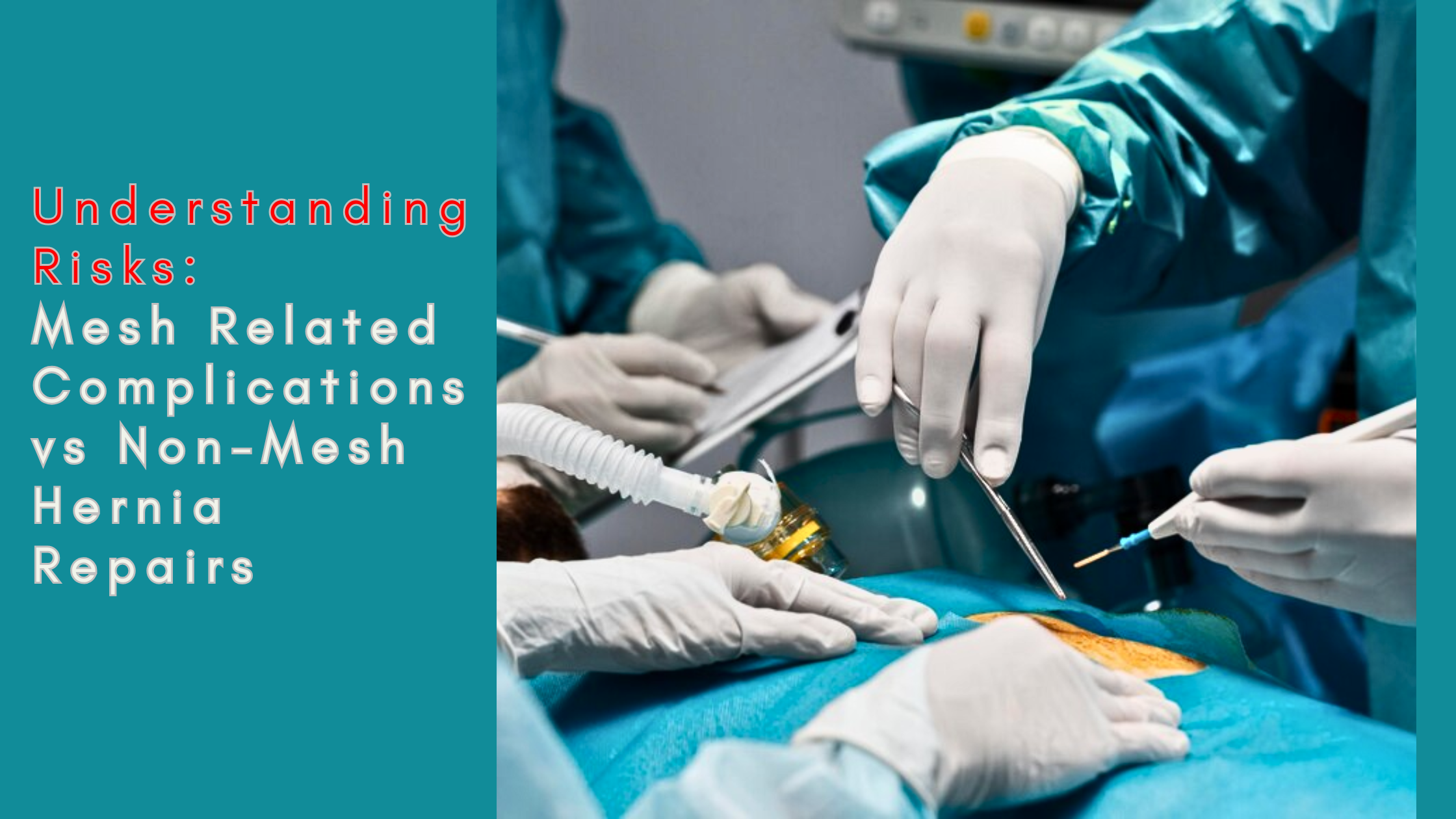Mesh-Related Complications vs Non-Mesh Hernia Repairs
Hernia repairs surgery is a common procedure, but deciding between mesh and non-mesh options can feel overwhelming. Each approach has unique risks, benefits, and implications. By understanding these risks, patients can work with their surgeon to choose the best method for their individual needs.
The Risks of Mesh Hernia Repairs Related Complications
1. Infection
Although uncommon, mesh implants can sometimes become infected. This may occur due to contamination during surgery or if the body reacts adversely to the foreign material. Symptoms include redness, swelling, and discharge at the surgical site.
2. Chronic Pain
A small percentage of patients report ongoing pain after mesh repair. This can result from the mesh irritating surrounding tissues or nerves. In rare cases, revision surgery may be required to alleviate discomfort.
3. Mesh Migration or Erosion
In rare instances, the mesh can shift from its intended position, causing complications such as organ damage or recurrence of the hernia. Advanced surgical techniques and high-quality materials minimize this risk.
4. Adhesions and Scar Tissue
Some patients may develop excessive scar tissue or adhesions around the mesh, which can lead to discomfort or complications, particularly in abdominal hernias.
5. Allergic Reactions or Rejection
While modern meshes are biocompatible, certain individuals may have an allergic reaction to the material, leading to inflammation or the body rejecting the implant.
The Risks of Non-Mesh Hernia Repairs
1. Higher Recurrence Rates
Without mesh reinforcement, non-mesh repairs may be less effective in preventing hernia recurrence, particularly for large or complex hernias.
2. Increased Tension on Tissues
Non-mesh repairs rely on stitching natural tissues together. This can create tension in the surrounding muscles, increasing the risk of tearing or post-surgical discomfort.
3. Longer Recovery Period
Because non-mesh repairs involve significant manipulation of natural tissues, recovery may be slower compared to mesh-based procedures.
4. Limited Suitability
Non-mesh repairs are typically only recommended for small or uncomplicated hernias. Larger hernias or patients with weaker tissue may not be good candidates for this method.
How to Decide: Key Considerations
- Hernia Size and Location
Small hernias may respond well to non-mesh repairs, while larger or recurrent hernias usually benefit from the added support of a mesh implant. - Patient’s Health and Lifestyle
Individuals with strong tissues and no history of hernia recurrence may prefer non-mesh repairs. However, those with chronic conditions or physically demanding jobs may require the durability of mesh-based solutions. - Surgeon Expertise
Discussing your options with an experienced hernia surgeon is essential. They can evaluate your condition and provide tailored advice based on your unique circumstances.
Conclusion: Mesh-Related Complications vs Non-Mesh Hernia Repairs
Both mesh and non-mesh hernia repairs have associated risks, but understanding these differences can help patients make an informed decision. Mesh repairs offer robust support for larger hernias but carry a small risk of complications, while non-mesh repairs are suitable for select cases but may involve longer recovery and higher recurrence rates.
Looking for a hernia surgery in Delhi? Partner with the best hernia surgeon in Delhi to discuss your needs and select the repair method that aligns best with your health and lifestyle goals.
FAQs: Understanding Risks in Mesh vs. Non-Mesh Hernia Repairs
1. What are the most common complications associated with mesh hernia repairs?
Mesh hernia repair is generally safe, but complications can include infection, chronic pain, mesh migration, adhesions, or, in rare cases, allergic reactions. Advanced surgical techniques and high-quality mesh materials help minimize these risks.
2. Are non-mesh hernia repairs a better option for everyone?
Non-mesh repairs are suitable for smaller or uncomplicated hernias and patients with strong tissue health. However, they may have higher recurrence rates and longer recovery times, making them less ideal for larger or complex hernias.
3. How do I know which hernia repairs method is best for me?
The choice depends on the size and type of your hernia, overall health, lifestyle, and preferences. Consulting a skilled hernia surgeon is crucial for evaluating your condition and tailoring the treatment to your needs.
4. Are there ways to prevent mesh-related complications?
Yes, choosing an experienced surgeon, adhering to post-operative care instructions, and opting for high-quality, biocompatible mesh can significantly reduce the risk of complications such as infection or migration.
5. Can non-mesh repairs completely eliminate the risk of complications?
Non-mesh repairs avoid mesh-related issues but come with their own risks, such as tension on natural tissues, slower recovery, and higher recurrence rates in some cases. Every surgical option has benefits and potential drawbacks to consider.




